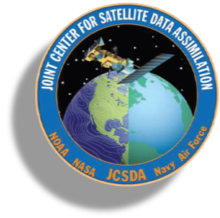The Joint Center for Satellite Data Assimilation (JCSDA) is pleased to announce the first public, open-source release of the Joint Effort for Data assimilation Integration (JEDI) system on October 28, 2020. JEDI is a community effort developed and distributed by the JCSDA, a multi-agency research center with its operations hosted by the University Corporation for Atmospheric Research (UCAR).
JEDI Vision, Objectives and Capabilities
JEDI is a unified and versatile data assimilation (DA) system for Earth system prediction. JEDI is designed for a variety of purposes, from teaching and learning DA fundamentals to the development and validation of new DA algorithms and observational operators, to leading-edge atmospheric and oceanic research, to operational weather forecasting. The JEDI software package can be run on a variety of platforms from laptops to supercomputers, and it can readily accommodate new atmospheric and oceanic models and new observation systems. Community contributions are highly encouraged and will be managed through pull requests to JCSDA public repositories on GitHub.
Features of the JEDI-FV3 Release 1.0.0
The JEDI-FV3 release 1.0.0 will contain everything needed to emulate JCSDA’s near-real-time monitoring application. This includes interfaces for processing a wide variety of observational data and a library of observation operators for conventional, satellite radiance and GNSS radio-occultation measurements that can be run from both FV3-based GFS and GEOS models. The release will also unveil core JEDI components such as high-level variational and hybrid DA algorithms, and generic utilities for handling background error covariance matrices.
The JEDI-FV3 release 1.0.0 package will contain the following:
Source code, run scripts, and configuration files on publicly accessible JCSDA Github repository under open-source license.
A container equipped with the environment to easily pull from GitHub and build executables, together with all the data needed to run the observation operators for a single pre-canned “golden day”. Forecast models available for DA applications include FV3-GFS and FV3-GEOS.
The release documentation will include examples and a self-paced online tutorial posted on the JCSDA website. More comprehensive tutorials addressing specific features and use cases will be added in the weeks following the release.
JEDI Support
Support for the initial public release of JEDI-FV3 1.0.0 will be handled primarily through JCSDA public forums monitored by core JEDI developers. This includes general questions about the JEDI project and code design as well as targeted questions about running applications, troubleshooting, and contributing to the code base. The JCSDA forums will also solicit community feedback and suggestions for future features.
Community Involvement in Agile Development
The community will be able to access the stable tagged version of the code as well as the latest development, via GitFlow’s master and develop branches respectively. As soon as JEDI-FV3 1.0.0 is released, community users are encouraged to engage in agile development on GitHub, utilizing the support forums for questions as needed. JCSDA’s near-real-time monitoring application will act as a showroom of the latest capabilities following a continuous integration and delivery approach.
Application for the 5th JEDI Academy
As in previous years, the Academy will consist of several lectures and practicums presented by members of the JEDI core team. The 5th JEDI Academy will be held virtually via Zoom on November 16-20, 2020. Please apply here by November 4, 2020.
Virtual lecture sessions will involve pre-recorded presentations and interactive Q&A. The practical sessions will take advantage of the JEDI-FV3 1.0.0 public release and they are capped at 40 applicants. Preference will be given to community members who demonstrate early and frequent involvement on JCSDA GitHub (e.g. code reviews) and forums. Selected participants for practical sessions will be notified via email.
Information About JCSDA Releases
Many more features will be added in subsequent releases (e.g. stand-alone unified forward operator, WRF, MPAS, toy models, marine DA). Make sure to subscribe to JCSDA News mailing list for release updates, bug fixes, and new release announcements.

